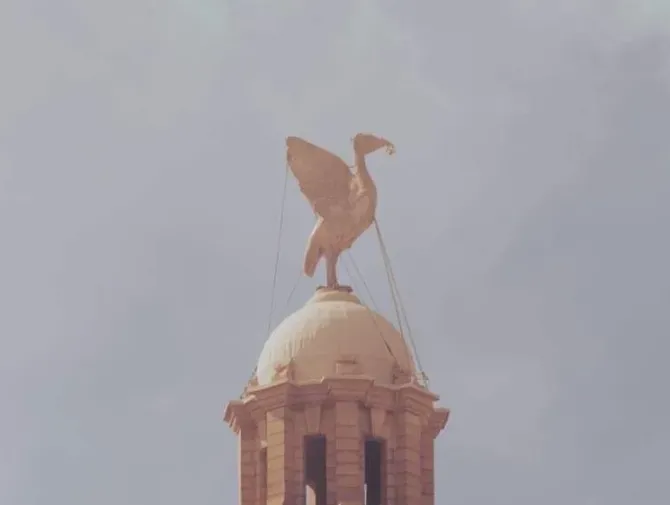A burst pipe and a botched response

A burst pipe causes carnage for 30,000 homes – plus the rest of your Monday briefing
Dear readers — welcome to your weekly briefing. Over the weekend, thousands of people in north Liverpool and Sefton went without water or had a limited supply. We’ve been investigating what happened and have some new details on the story below.
Plus, we recommend art exhibitions in city parks and a feature by the Wirral-based and very popular author Tabitha Lasley on a typical summer day at Liverpool Airport.
This morning, essential Liverpool reading from @liverpoolpost
— Ronnie Hughes (@RonnieWriting) 6:56 AM ∙ Jul 23, 2022
“Tony Reeves was hailed as the saviour of Liverpool. So why did he quit?” @liverpoolpost
At the weekend, we published a long read about why Liverpool City Council’s chief executive Tony Reeves resigned last week and asked where the city goes next. One source told us: “He's not the greatest administrator in human history, but the fact that Liverpool has managed to spit him out, it doesn't reflect well on anyone. Tony or Liverpool.” Politics lecturer and original Post member David Jeffery said on Twitter: “In just two long-read articles the Post has covered the goings on in Liverpool City Council in much more depth than the Echo could manage. Proper journalism, and well worth a follow” (the other story he was referring to is here).
Last week, we sent Post members a very funny story about Jack’s stay in the budget holiday camp Pontins Southport. “Entertaining and depressing in equal measure,” said one reader, while another called it “Hilarious and poignant”. Join up as a member to get great writing and poignant entertainment in your inbox twice a week with our members-only editions. We also published a members-only dispatch from a stormy council meeting which delivered the inevitable: Liverpool will be mayor-less from next year.
In just two long-read articles the Post has covered the goings on in Liverpool City Council in much more depth than the Echo could manage. Proper journalism, and well worth a follow (and a sub!).
— Dr David Jeffery (@DrDavidJeffery) 8:23 AM ∙ Jul 24, 2022
If you’d like to read these stories, you can subscribe using the button below. We now have 490 paying members on our list and we’re just 10 away from hitting our target of reaching 500 by the end of the summer. If you know someone who might enjoy The Post and want to see a renaissance of high quality local journalism on Merseyside, please do consider forwarding them this email to spread the word.
☁️ This week’s weather

The big story: A frustrating and water-less weekend
Top line: Thousands of families spent the weekend without water after a major 24-inch pipe burst in Sefton. United Utilities confirmed that 30,000 homes were affected, all of which have now had their water restored, but questions are being raised over the quality of their response.
Poor planning: Metro Mayor Steve Rotheram said on Twitter there had been a “basic lack of emergency planning” from United Utilities and criticised their “failure to properly communicate with residents or put proper infrastructure in place to help mitigate the situation”. Hours passed on Saturday before many residents got any kind of response and the local councils struggled to establish good communications with the company.
Emergency stations run dry: Two main stations were established over the weekend to supply emergency water supplies, in Netherton and Crosby. The one in Crosby — at a Sainsburys — had a queue which stretched back for over half a mile on Sunday and left some people waiting for hours to collect their water. It then ran out in the afternoon.
Well, that was an adventure. Good luck getting water today, fellow residents of south Sefton and north Liverpool. Hope this gets sorted soon @unitedutilities.
— Stuart Wilks-Heeg (@StuartWilksHeeg) 10:12 AM ∙ Jul 24, 2022
Tales of woe: Residents across north Liverpool and Sefton described the situation as it unfolded on Twitter, with some responses more colourful than others.
“Washing hands with baby wipes, brushing teeth with bottled water, let’s not talk about the toilet,” wrote one.
“It’s basically suburban Lord of the Flies in L22,” read another.
One of those affected was University of Liverpool politics professor Stuart Wilks-Heeg. Speaking to The Post, Wilks-Heeg said he had “absolutely no water whatsoever by Saturday night” and on Twitter criticised United Utilities' “shoulder shrugging” communication with residents. Realising the next morning how long queues would be, he cycled to the Crosby station and stocked up, documenting on video the huge line of cars he passed.
Declining help? A twist came when Sefton Central Labour MP Bill Esterson urged United Utilities to “accept the offer of extra sites”. Esterson told us that Sefton Council had attempted to aid the water company with an offer to establish further emergency water supply sites, but it was not taken up. “It was blindingly obvious they needed far more than two sites,” he said. According to Esterson, a senior United Utilities executive wasn’t even aware that his constituency was affected. “The response left a lot to be desired,” he said.
A spokesperson for United Utilities told us: “Four bottled water distribution locations were provisionally offered by the council — one was used, two were inaccessible due to the burst and it was determined the fourth was too close to the first location. A further two locations were identified and used in parts across the weekend. During the Tactical Coordination Group meetings on Sunday, the council suggested additional locations but it was agreed between partners that these were not required as the repair was nearing completion.”

Taking the hit: Having apologised for the inconvenience, United Utilities confirmed that automatic compensation payments would be made to anyone who went without water for more than 12 hours.
Context: It won’t be the first time water suppliers have to pay out for major screw-ups. As Byline Times reported last year, the UK’s water companies have paid a total of £405m in fines over the course of a decade. Many of these are for violations of environmental, health and safety or labour laws.
Elderly people struggle: Wilks-Heeg wonders whether these companies are so focused on their digital response to a crisis like this, they overlook on-the-ground solutions. “I think, by now, there just aren’t enough people around who recall how these things were done in a pre-digital age,” he said on Twitter. Further, where there are elderly people without internet access, this leaves them isolated from necessary information.
Bottom line: As of this morning, everyone affected has their water restored. But the initial failure to communicate with residents and the confusion surrounding the offer of additional emergency sites points at a botched response. Esterson confirmed an inquiry would be held into the weekend’s events.
Your Post briefing
- Labour leader Sir Keir Starmer delivered a keynote speech in Liverpool today, trying to explain how Labour will jumpstart the country’s dismal economic growth. “We can’t be like the Tories, clinging to the old ideas, trapped in our history,” he said, speaking at The Spine and further signalling the party’s move away from Corbynism. But comments by his shadow chancellor Rachel Reeves, suggesting Labour has abandoned plans to re-nationalise rail, water and energy ignited a row, forcing the shadow transport secretary to clarify: “Labour is committed to public ownership of rail”. No doubt that argument will rumble on at the party’s conference in Liverpool in September — we’re just securing our press accreditation for that so we can bring you the gory details.
- A body has been found in the search for 23-year-old Haydn Griffiths who went missing after swimming in the Mersey last Tuesday. Griffiths was swimming with a friend and attempted to get out to some nearby wind turbines but went under the water and did not resurface. A massive search the following day was unsuccessful, but police have now confirmed the discovery of a body close to Pier Head. The death is being treated as unexplained with a post mortem examination set to take place. More information here.
- David Moores — former chairman and owner of Liverpool FC — has died aged 76. Moores was an heir to the Littlewoods empire founded by his uncle, former Everton chairman Sir John Moores. The family were majority shareholders in Liverpool FC for more than half a century and he took over as chairman in 1991, serving until 2007 when he sold his shareholding to Americans George Gillett and Tom Hicks. After the new duo drove the club into massive debt and performances plummeted, Moores later expressed his regret at selling.
- Scores of lycra-clad bands and coked-up singers could be making their way to Merseyside next summer. The Eurovision Song Contest 2023 will be held in the UK, with Liverpool vying to be the host city. The Ukrainian entry — Kalush Orchestra — won this year’s contest and it is tradition for the winning nation to host the following year, but security fears made this impossible. Liverpool currently lead in a non-binding fan poll (with 32% of the vote, giving a healthy lead over second-placed Leeds on 24%) and have officially expressed an interest. Mayor Joanne Anderson said: “We stand in solidarity with the people of Ukraine and would like the opportunity for Liverpool to host the 2023 Eurovision Song Contest and in doing so pay tribute to their wonderful country.” Get voting!
Home of the week

This two bedroom end-of-terrace in St Helens is on the market for £135,000. It has a luscious garden and baroque interiors which you really have to see for yourself.
Post Picks
🎤 It’s time to dance: it’s Liverpool International Music Festival this weekend. This year, the programme has been curated with the themes of purpose and people power in mind. Kojey Radical, De La Soul, Heather Small and UB40 will perform at different venues across the city, including M&S Bank Arena, the Bombed Out Church, 24 Kitchen Street and Arts Club Liverpool. Tickets here.
☀️ Not A Cloud In The Sky, a free exhibition organised by Convenience Gallery, pops up in the indoor visitor centre in Birkenhead Park this week. It showcases the work of over 20 artists from the North West exploring their memories of parks.
💃 If you’re in the mood for something more energetic, there’s Latin dancing and drumming in Princes Park starting this Thursday. The sessions are free and an informal way to engage with Latin American arts and culture and meet new people.
🥗 For this week’s food shop, we recommend visiting Windmill Wholefoods, an organic wholefoods shop in Aigburth that stocks a wide range of ethical and fair trade foods as well as household and sanitary products. It opens Wednesdays, Thursdays and Saturdays.
🧵 A local artist collective is hosting a free flax weaving event in Bootle Library on Thursday afternoon. It’s an opportunity to learn the technique and learn about Bootle and Linacre’s history of linen production (Linacre means “an acre of linen”).
🎨 Free children’s art workshops — the rite of all summer holidays — are back at Williamson Art Gallery on Saturday. Sessions will take inspiration from classical imagery from the current exhibition The Wonderful World of the Ladybird Book Artists.
Our favourite reads
Tabitha Lasley, the Wirral-born writer who wrote Sea State, an extremely well reviewed memoir about her love affair with an oil rig worker, visits Liverpool Airport to write about a typical British summer’s day for The Guardian. “The overriding sentiment I hear today is relief; that borders are opening up again, and people are free, at last, to fly. The city’s vexed relationship with rules has as much to do with geography as history. Liverpool is a port and looks out towards the ocean. It has its back to England, and so generally disdains what the rest of the country is doing.”
In this interview in Film Hub North, film director Lee Armstrong discusses his short film Liverpool Ferry, which tells the story of a 17-year-old girl and her boyfriend travelling from Belfast to Liverpool to access an abortion. “I think what Liverpool Ferry does well is try to stay impartial; it doesn’t judge either side. Instead, it allows people the opportunity to observe and consider how forcing personal ideologies on other individuals can put women, often very young women, in very vulnerable positions.” You can watch the film for free here.
We enjoyed reading this extract in Vice from writer and journalist Angela Hui’s memoir exploring growing up in a beloved Chinese takeaway. Hui writes that “Chinese takeaways in the UK are often seen through the lens of exoticism and fetishisation” and argues that local food traditions like spice bags in Ireland and Liverpool’s salt and pepper chips deserve respect as they are “all expressions of what it means to be Chinese in the West.”
A lavish feature in The New York Times Magazine about an intimate dinner party in an orchard of blooming poppies on the site of a 16th-century stone manor house in the Cotswolds that was once home to ancestors of the current Earl of Liverpool. It features some beautiful photos from the night, plus this passage about the sunset: “As the sun set and the poppies began to close (‘It’s like they were doing a dance with us’) out came a crostata topped with wild strawberries and globs of cream, a sweet end to a memorable evening.”
Photo of the week

The Liver building on a hazy summer day. Thanks to Phil Challinor for the photo.
Letters from readers
Excellent — my hope is that Britannia Hotels read the article and abandon their race to the bottom......of a dank and dismal boating pool ‘False teeth and false dreams at Pontins’, Lynne
Yesterday I attended a debate in Lark Lane and the motion was "This House Believes that Liberal Democracies have Become Much More Fragile". The motion was carried 10-4, with some abstentions. After reading this article it could have been that I would become even more depressed about the future of democracy but, curiously, I felt more hopeful. I think it was because good journalism, holding people to account and speaking truth to power, is also an integral part of our democratic system’ Tony Reeves was hailed as the saviour of Liverpool. So why did he quit?’, Ming-Ko

Comments
Latest
This email contains the perfect Christmas gift
Merseyside Police descend on Knowsley
Losing local radio — and my mum
And the winner is...
A burst pipe and a botched response
A burst pipe causes carnage for 30,000 homes – plus the rest of your Monday briefing